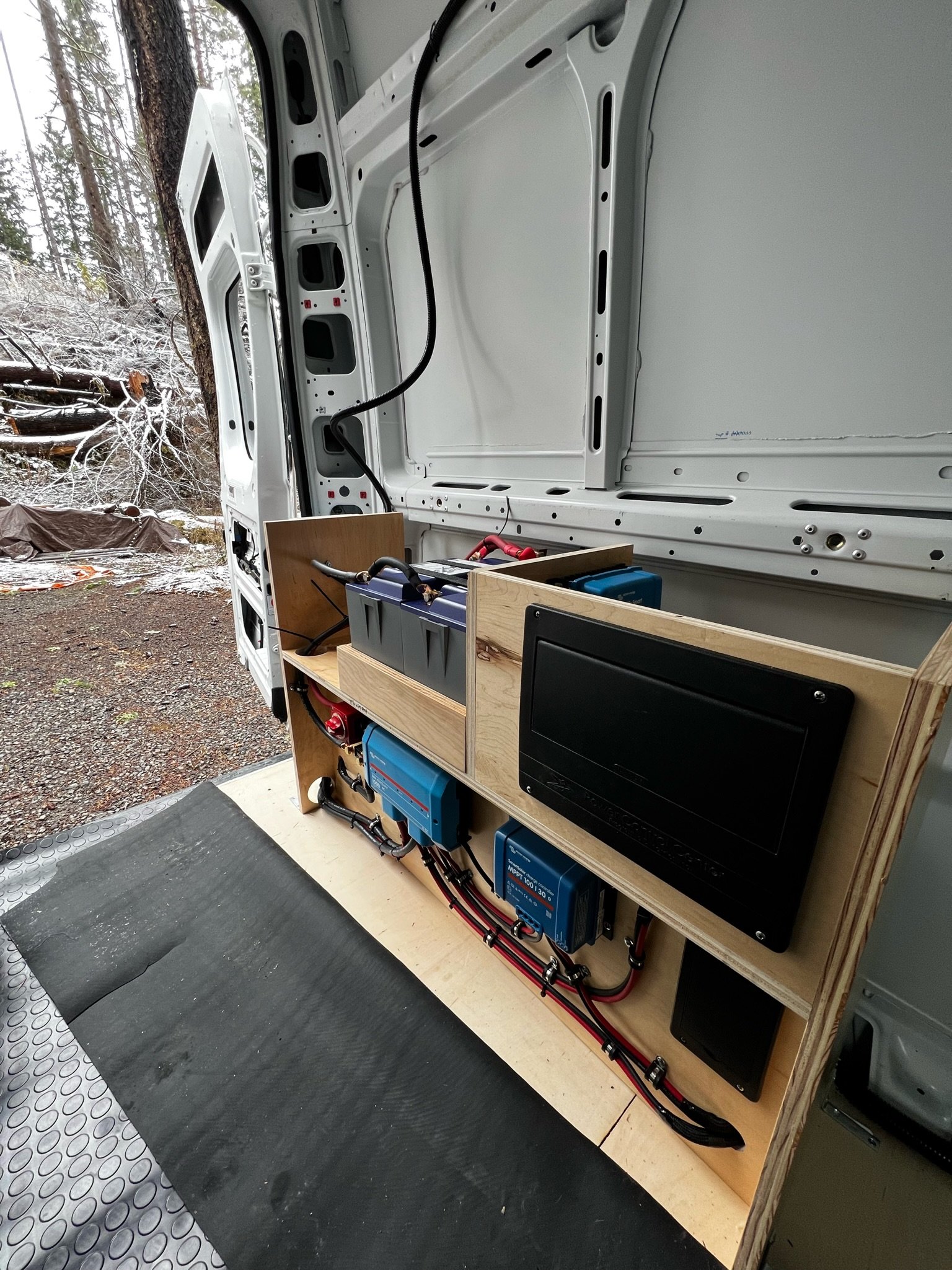CC Van’s Installation of The Weekender
I plugged a full size Shark vacuum into my first off-grid camper electrical system once. My original van’s electrical system included one 100 Amp Hour lead acid battery and a 500 watt inverter. I knew the system charged off my alternator and the 100 Watts of solar I had on the roof of my van. Outside of that I didn’t have much knowledge other than the information that was shared to me by my friends who helped me put it together. It was limited. I knew enough to realize that once I plugged in that vacuum and turned it on, that I absolutely knew nothing about the intricacies of my camper's electrical system. Fuses blew, batteries were unhappy, and I was defeated.
I shared this story with our client, Kel, during our final training on their system. We were talking about power management and how to understand what their system could handle. As we walked through AC power vs. DC power chatting through how much power you are drawing at once so you can manage your batteries properly, they asked if they would break the system with a vacuum. I just laughed as that memory popped into my head.
First, our systems are made with every safety precaution in place. Secondly, Victron’s products know to turn themselves off if too much power is pushed through. So, there will not be sparks or a loud pop unlike when I plugged in my vacuum into my original system. If you plug in a device that has too high of a draw for any of the systems we build, it will just simply turn itself off and wait for you to reset it manually. While we didn’t have the power needed for their vacuum, we do know they will be safe if they try.
Kel, connected with us at the beginning of their build process. Just getting started and new to everything van life. Their plan was to use the van and slowly build it out at the same time. With that, they wanted to make sure their electrical was sound so their transition into the van could be sustainable! Plus, building and using a van in the Pacific Northwest in the winter months, you definitely need a heater and a way to make warm food.
Note: For those of you building out your own vans or campers and looking for support with the electrical system, we are here to help! We recommend having your camper floors installed, an idea of electrical needs, as well an understanding of your van layout before moving forward to your electrical project.
One of Kel’s main goals was to build a system that could grow. For the foreseeable build months they would mostly be plugged into shore power, so solar would be something they would add in the future. Also, due to planning to be plugged in they wanted to start with 200 amp hours of batteries and space to upgrade to 300 amp hours in the future.
We reviewed their power draws, future plans and goals, coming to the decision that The Weekender was a great fit for all of their needs. The Weekender includes 2000 Watts of inverting power and for this build we installed 200 amp hours of Battle Born batteries. The system inputs would be shore power and alternator charging, as well a solar port so the system is solar ready. We sized the solar controller to manage up to 400 watts of solar power..
Full system Review
The electrical system included the following components.
Victron 12-12-30 Orion DC-DC charger for alternator charging up to 30 amps.
Victron 100/30 MPPT Solar Charger for a future solar system up to 400 Watts.
Victron Multiplus 12 | 2000 Watt Inverter/Charger for shore power charging and AC power distribution.
Victron Lynx Distributor as the busbar with DC fuses and monitoring.
Two 100 Amp Hour Battle Born Lithium batteries.
The system is monitored by Victron BMV-712 Battery monitor.
System design certified by Explorist.life.
Understanding the power draws of electrical items we use day-to-day is not something we are all taught. It took us trial and error, education, troubleshooting, and learning from others (thanks Explorist.life) to fully understand the intricacies of our van’s off-grid electrical system.
Often you will hear Ira say, learn from the mistakes we have already made. I believe that to be so true. I have made the mistake of not understanding how much power a household item like a vacuum draws. Then I learned how to reset the fuses in my system, how to add in safety components, and manage my power draws. Our goal is to empower our clients through stories and education to use their campers off-grid electrical systems autonomously and confidently. To be able to share that knowledge with our clients so they don’t have to work through the headaches and frustrations we did, well that brings me joy!
We got a video update a few days after Kel was home, back working on the van. It was a video of the heater making the van so warm!!! That video is why we do what we do.
If you are interested in working with us, please connect with us!
Cheers!
The Joule Adventures Team






